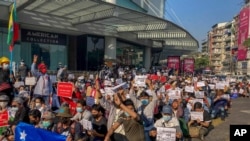Demonstrators gathered in the streets of Myanmar’s capital again Tuesday for a fourth consecutive day, defying a set of restrictions imposed by the military junta aimed at stopping the massive protests against the overthrow of the elected civilian government.
Tuesday’s protests in Naypyitaw occurred just hours after the military announced an 8 p.m. to 4 a.m. curfew would be imposed in the cities of Yangon and Mandalay. The regime has also banned gatherings of more than four people across the country.
Demonstrations were also staged in Yangon and Mandalay. News agencies say the protesters were blasted with water cannon in all three cities.
Tens of thousands of people have come out in force across Myanmar since the demonstrations began, holding signs reading “Save Myanmar,” “We want democracy,” as well as photographs of Aung San Suu Kyi, the de facto leader of the deposed government. Protesters also raised a three-finger salute as they marched, a sign of resistance against tyranny in the popular “Hunger Games” movies.
The demonstrations entered a new phase Monday as civil servants, railway employees, teachers and workers in other sectors began a nationwide strike.
But Senior General Min Aung Hlaing, the general who led the coup, made no mention of the unrest in his address to the nation Monday evening, his first since taking power exactly one week earlier.
The general reiterated claims that last November’s elections, overwhelmingly won by Suu Kyi’s National League for Democracy party, were fraudulent. But he promised to hold new elections to bring a "true and disciplined democracy" different from previous eras of military rule.
He did not specify when the new elections would take place. The military has declared a one year state of emergency.
Suu Kyi remains under house arrest at her official residence in Naypyitaw, according to party spokesman Kyi Toe.
She faces charges of illegally importing and using six unregistered walkie-talkie radios found during a search of her home.
On Friday, nearly 300 members of Suu Kyi's deposed ruling party proclaimed themselves to be the only lawful representatives of the country’s citizenry and called for global recognition as the stewards of the government.
The military takeover has been condemned by U.S. President Joe Biden and other world leaders, who called for the elected government to be restored to power.
New Zealand said Tuesday it is suspending all high-level military and political contacts with Myanmar and is imposing a travel ban on its leaders.
The United Nations has called for the coup to be “reversed,” urging international actors to “carry out calls for a return to democracy.” The world body’s Human Rights Council will hold a special session Friday to discuss the crisis.
Myanmar, also known as Burma, has long struggled between civilian and military rule, but until last week had been enjoying a hopeful transition to democracy.
A British colony until 1948, the country was ruled by military-backed dictators from 1962 until 2010.
An uprising in 1988 led to an election in 1990, which the NLD won in a landslide. But the elected members of parliament were imprisoned, and the dictatorship continued.
Suu Kyi, the daughter of Myanmar's assassinated independence hero, Gen. Aung San, emerged as a leader in the pro-democracy rallies and in the NLD. She was awarded the Nobel Peace Prize in 1991 while under house arrest.
In 2010, Senior General Than Shwe announced the country would be handed over to civilian leaders, who included retired generals. They freed political prisoners, including the lawmakers from the NLD, and Suu Kyi, who was elected in a 2012 by-election and later became the state counsellor of Myanmar.
While popular among Myanmar’s Buddhist majority, the 75 year old Suu Kyi has seen her international reputation decline over her government’s treatment of the country's mostly Muslim Rohingya minority.
In 2017, an army crackdown against the Rohingya, sparked by deadly attacks on police stations in Rakhine State, led hundreds of thousands of them to flee to neighboring Bangladesh, where they remain.
The International Criminal Court is investigating Myanmar for crimes against humanity.




